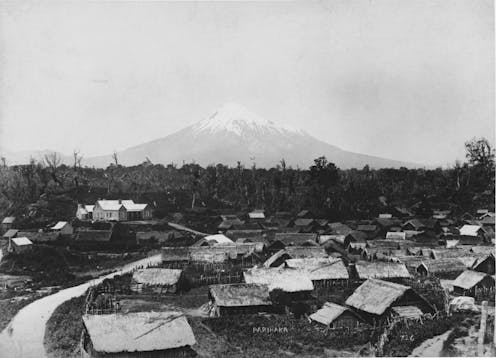Uncovering the stories my family forgot, about a past still haunting Aotearoa New Zealand
- Written by Richard Shaw, Professor of Politics, Massey University

The day my great-grandfather Andrew Gilhooly was buried at Taranaki’s Ōkato cemetery in early February 1922, Jas Higgins played the Last Post. Neither man had seen active service in the “great war” with which that ritual is most closely associated. Rather, both had served in the New Zealand wars, an earlier series of conflicts fought across the mid-to-late 19th century as part of the colonisation of Aotearoa New Zealand.
In New Zealand and Australia it’s a mark of honour to have ancestors who fought on the Dardanelles or at the Somme or Passchendaele. A national origin myth has been constructed around the Anzacs, replete with a day of remembrance, outsized monuments, and a rich tradition of rituals that are rehearsed annually “lest we forget”.
Nothing like the same emotional (or financial) investment is made in remembering the wars that took place at home. Our own colonial violence, in Taranaki and at Ōrākau, Pukehinahina/Gate Pā and elsewhere, has been relegated to the margins of the national consciousness. It’s an ongoing process of selective historical amnesia that we’re only slowly beginning to address – not so much lest we forget, as best we forget.
This might explain why I grew up knowing next to nothing about my maternal great-grandfather. Yes, there were plenty of stories about his wife (roundly condemned as having been a “difficult” woman) and six children (farmers, priestly prodigies and musical spinsters). However, other than the bare facts that he was born into a poor farming family in County Limerick in Ireland and had served in the New Zealand Armed Constabulary (AC), about Andrew there was only silence.
Last year I wrote a small family memoir, The Forgotten Coast, in an attempt to address that and other silences in my family. As it turned out, the bugling of Jas Higgins at the graveside was the least of the things I didn’t know about my great-grandfather.
Family silences
Andrew became the conundrum at the heart of the book, but he was not the reason I began it. On Christmas Eve 2012, my father died during heart surgery we thought would be routine, but which rapidly became complicated. There were things I wish I’d said to him, and I started writing as a way of doing so.





